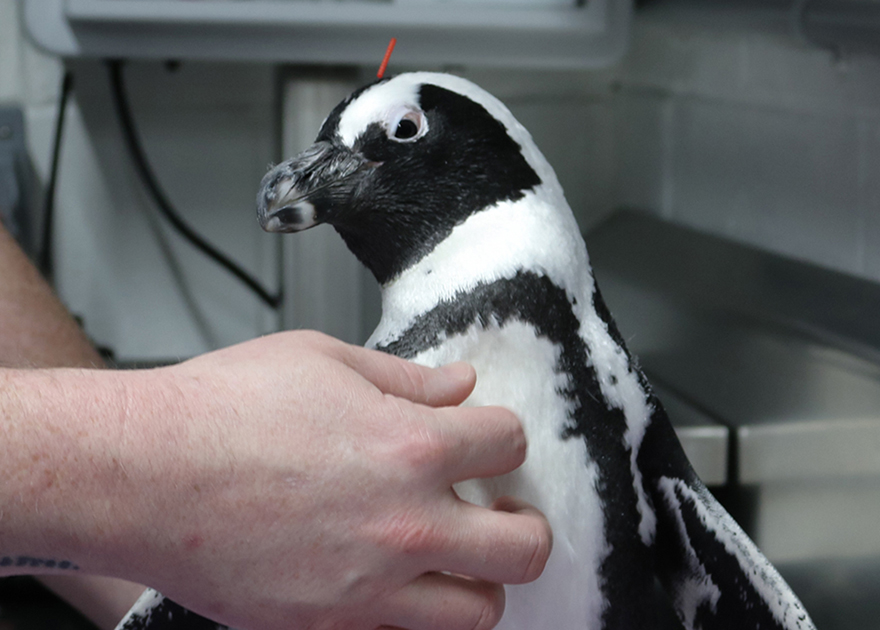
BOSTON, MASS. (March 7, 2024) – An African penguin at the New England Aquarium is benefitting from acupuncture treatments as veterinary staff treat her for signs of spinal discomfort.
**PHOTOS AVAILABLE HERE WITH CREDIT TO NEW ENGLAND AQUARIUM**
“Peeko” is a 30-year-old penguin who was born and raised at the Aquarium. She has tripled the life expectancy of African penguins in their native environment, which means she is considered a geriatric bird. As with an elderly human patient, Peeko has exhibited signs of advanced age including abnormal posturing when she stands and walks, which can often signal osteoarthritis or degenerative spinal disease.
“Similar to humans, treatment options for birds with degenerative spinal disorders typically rely on pain medication and physical therapy. Alternative therapies, such as acupuncture and laser treatment, can be added to help improve comfort level and speed up recovery,” said Dr. Melissa Joblon, the Aquarium’s director of animal health.
Acupuncture is used in local areas where there is muscle tightness, so it can decrease inflammation and increase circulation. To alleviate Peeko’s discomfort, the Aquarium sought out the expertise of Dr. Claire McManus, a licensed acupuncturist for more than two decades who treats both humans and animals. Dr. McManus has treated Peeko twice over the past 18 months—following an expected weight gain during the penguin’s annual molt, or replacement of feathers. As with human patients, weight gain can exacerbate signs of arthritis or other orthopedic disorders. During the acupuncture procedure, Dr. McManus uses 10 to 14 hair-thin needles to provide relief for the penguin.
“When working with animals, we first want to consider how we can treat them with the least amount of stress as possible. We’re trying to use the fewest needles for the biggest impact,” Dr. McManus said.
During the 15-minute acupuncture treatment, Dr. McManus and Aquarium staff report that Peeko instantly becomes calm, relaxing into the penguin trainer’s hands, even preening herself and her trainers. Through husbandry work and training sessions, Aquarium penguin trainers have ensured the procedure is a positive experience for the bird, who responds to tactile rewards such as back scratches.
“You can really tell with the penguins that they’re enjoying the acupuncture. It’s a joy to work with these animals,” said Dr. McManus, who has treated dogs, warthogs, donkeys, and camels in the past.
Within a few weeks of the procedure, Peeko and other penguins that have received acupuncture appear more agile and active in their habitat, walking better and even having an improved appetite.
“We definitely saw signs of improvement in Peeko’s general status and mobility after adding acupuncture to her treatment plan,” Dr. Joblon said. “It’s very rewarding to see improved quality of life of our geriatric patients following these treatments.”
In addition to older penguins, the Aquarium has also worked with Dr. McManus to provide acupuncture treatment for rehabilitating sea turtles at its Sea Turtle Hospital in Quincy, MA. These animals are rescued with serious medical conditions including bone infections, fractures, sepsis, and pneumonia, and acupuncture has been shown to help treat musculoskeletal injuries as well as gastrointestinal disorders.
More information on the animal acupuncture treatment is available on the Aquarium’s blog.
MEDIA CONTACT: Pam Bechtold Snyder, psnyder@neaq.org; 617-686-5068
